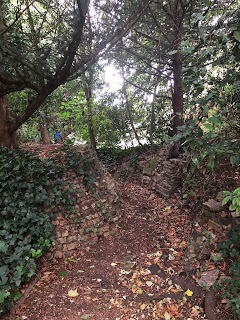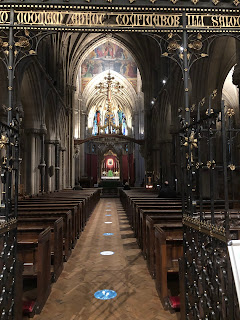"Normally the patient sits in that seat," said the doctor, or words to that effect, to me.
Yes, Benedict Ambrose and I were back at the hospital. This time we were there to hear the results of his most recent scan, the one that followed six weeks of radiotherapy to stop the resurgent tumour which, to add insult to injury, had brought along two friends.
Fortunately it was my "retreat day" from work, so I simply brought along Peter Kwasniewski's Tradition & Sanity with me to the waiting room. I was at Mass dark and early at 8 AM, and afterwards our priest loaned me Michael Davies' Liturgical Revolution Volume II, so B.A. read that.
I always go the hospital with B.A. to hear medical pronouncements because too often he doesn't come home afterwards: it's back to the ward with him. The news is usually bad although, come to think of it, this is better than whichever doctor saying B.A. is fine when I know he is NOT fine.
When B.A.'s name was called, we gathered our coats and books and sped off to the consulting room, where I chose the seat closest to the oncologist's desk as it was pushed farther back. However, it turned out to be the wrong choice, and I had a sense that the doctor was faintly surprised that I was in the office at all, which shows that she does not appreciate the implications of the Catholic marriage bond--or she is unaware that B.A. spent months of his cancer adventure delirious, increasingly blind and unable to remember much or ask important questions.
The news was good. The "tumour buds", which had rapidly doubled in size after being detected, have stopped growing. This is a great mercy, for apparently the radiotherapy was so aggressive, the doctor would not have done it a second time. One of the tumour buds looks like it is "necrotising," too--a word doctors use instead of dying. Die, tumour buds, die--but without taking my husband with you, thanks.
We looked at the latest interesting high-tech x-rays of the inside of B.A.'s head, which are almost amusing because some show his tongue, teeth and jaw, too. B.A. says he doesn't identify with these images; they seem completely apart from him. On one x-ray/computer image was a dark horseshoe shape representing where the oncologists had radiated B.A.'s brain, as close to his brain stem as possible without actually touching it.
B.A.'s tumours, by the way, are technically "benign" even though, left untreated, they would kill him. The problem is that they are basically on the worst, trickiest and most sensitive part of his brain. Normally this kind of brain tumour doesn't appear there. And normally this kind of brain tumour appears in five-year-olds. The probability of B.A. ever being in this situation was low, but here he is.
Slightly off-setting this misfortune is the fact that his neurosurgeon is a paediatrics neurosurgeon and so was probably one of the few people in the world who could have done the operation he did without leaving B.A. badly damaged---although famously I think the intercession of Our Lady of Fatima had something to do with that, too. And although the subsequent radiotherapy robbed B.A. of the ability to hear music properly, that turned out to be only temporary. Thank God for that.
After making an appointment for B.A. to come in for another scan in a few months, the doctor asked if we had any more questions. B.A. politely said "No," thus proving the importance of my being there.
"Can he go to Canada in [four] weeks?" I asked. "For Christmas? It's an eight hour flight."
Actually, it's more of a seven hour flight, but I was thinking of snowstorms and airplanes circling around Lester B. Pearson airport for ages, waiting for their turn to land.
The doctor looked perturbed.
"Have you booked your flights already?" she asked.
"No," we said. "We were waiting until we spoke to you."
That had been a good thing to do. To make a long consultation short, she thought it a very bad idea for B.A. to be on a long flight although if we had insisted she would have given him some sort of steroid to help him through it.
"No, no, no," I said, thinking of a disastrous flight to Pisa last year, so we don't know what this steroid would do, or why exactly it is a bad idea for B.A. to fly---quite apart from the cost of medical insurance for a cancer patient travelling to Canada, which is apparently astronomical.
Then B.A. remembered that we have already bought and paid for tickets to Poland in late January, but then the oncologist perked up and said that it was a good idea to start with a short flight. Therefore, we are still going to Poland although I am a bit frightened about it. If anything like what happened after we flew to Pisa happens in Poland, we are taking the train to Berlin in July. And now the Berlin trip is now even more about seeing family than it was about museums.
The oncologist advised us to go to the cancer patients' clubhouse for travelling insurance information for our European travels, so off we went to find it. We were met at the door by a kindly lady who showed us seats and offered tea and coffee and brought us cookies, a list of companies that insure cancer patients, and a schedule of cancer clubhouse activities. B.A. observed that it's my clubhouse, too, because I'm a Caregiver, to which I thought, "Dear God. I'm a Caregiver again."
A Caregiver (or "Carer") is the United Kingdom expression for a person--sometimes paid by the state--who does most of the in-home caring for a sick or disabled person. I think the expression is meant to encompass the vast variety of people who may fill this role. As a concept, it has positive and negative implications.
The positive aspect is that Caregivers are seen as a group of their own, and have their own clubs and advisers, who recognise how difficult being a Caregiver can be and that Caregivers need help and support. The negative aspect is that this reflects a breakdown in marriage and family. Once upon a time it was assumed that a wife took care of her sick husband, and vice versa, and parents took care of their disabled children, or children took care of their sick or disabled parents, and now it isn't.
But the implications regarding Broken Britain aside, I am grateful for the identity label and the resources available to Caregivers because, although obviously being the one with brain tumours is much worse, caring for a cancer patient can be frightfully annoying and difficult.
The most annoying part is being treated by hospital staff as if you don't belong beside your sick person. Believe me, just offering the sick person's spouse/'partner'/Caregiver a glass of water is an unusual act of kindness. Possibly the nurses don't do it very often because they're embarrassed when the spouse/'partner'/Caregiver bursts into tears of gratitude.
The most difficult parts are 1. second-guessing doctors and nurses--and I will never forget how starving B.A. was fasted a day longer than necessary because a nurse made a mistake, and I thought she had made a mistake, but she didn't--and 2. not knowing what to do when something goes wrong.
So although I am sad that we are not going to Canada for Christmas, I am glad that we are not going on a seven-hour flight. When we went to Italy in May 2017, we expected a relaxing holiday in which both of us would recover from the horrors of B.A.'s March diagnosis. The doctors had assured us that post-operative B.A. was fine. Fine to travel. Good to go. All was well. Nightmare over. Cheap flight to Pisa. Cheap train to Florence ...
And then when B.A. got off the train, he fell and could not get up. Somehow I carried him and all our luggage to a seat, but after that, I did not know what to do or what was going on and, God love us, we both preferred to believe the doctors couldn't possibly have been wrong and he just had "low blood sugar". Neither of us knew, then, what delirium looked like. Hint: not just someone raving on their pillow about a lost love. Most of the time B.A. was delirious, he spoke with complete conviction in an ordinary tone of voice. He passed basic cognitive damage tests with flying colours. He wandered off to central Edinburgh because he fancied a doughnut.
Well, anyway. No Toronto Christmas, but just remembering what happened in Florence (and then everything afterwards) has cheered me up a little. Better safe than that kind of sorry.
Update: I will say this again and again, but it is very shortsighted of the National Health Service not to recognise appropriately the role the sick person's primary caregiver plays in the healing of the patient. First of all, the caregiver has only ONE sick person in her care and so is an incredible resource. Second, the caregiver may be under so much stress, she is in danger of herself falling ill. If the caregiver falls ill, that can have a deleterious effect on the original patient. It will also add to the work of the NHS. Therefore, it is in everyone's interest to spend a half-minute a day acknowledging the primary caregiver, smiling at her or even offering her a glass of water.
Update 2: Given my readership, should acknowledge that our financial situation would be terrible if we were Americans or we lived in the United States without adequate health insurance. Speaking as a Canadian who lives in the UK and travels often to the Continent, I firmly believe in so-called "socialised medicine." There are a lot of things taxes shouldn't support, but cancer treatment is high on the list of things it should.


















